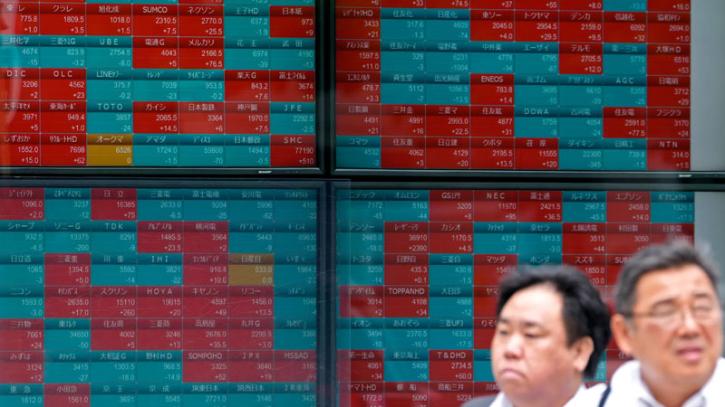Asian stocks slip as Mideast tensions sap confidence

Asian stocks fell on Tuesday as investors pondered looming U.S. interest rate cuts and awaited earnings from AI darling Nvidia, while rising tensions in the Middle East and supply concerns checked risk sentiment and lifted oil prices.
Gold prices were just shy of a record peak, while the dollar firmed and the yen hovered near its highest in three weeks as investors sough safety amid geopolitical risks, with Israel and Lebanon's Hezbollah exchanging fire on Sunday.
Also supporting crude prices was Libya's eastern-based government announcement of the closure of all oil fields, which halted production and exports.
Investors are on edge ahead of Nvidia's earnings report on Wednesday, where anything short of a stellar forecast from the AI chipmaker could jolt investor confidence in the AI-fuelled rally.
MSCI's broadest index of Asia-Pacific shares outside Japan was 0.36% lower on Tuesday, inching away from the one-month high it touched in the previous session.
Japan's Nikkei eased 0.16%, while Chinese stocks were also on the back foot.
China's blue stock index CSI300 fell 0.28% while Hong Kong's Hang Seng index was 1% lower in early trading, dragged by lacklustre earnings from Temu-parent PDD Holdings to lower consumer spending.
Also weighing on sentiment was the move by Canada, following the lead of the United States and European Union, to impose a 100% tariff on imports of Chinese electric vehicles and a 25% tariff on imported steel and aluminium from China.
POWELL PIVOT
In an eagerly awaited speech, Federal Reserve Chair Jerome Powell on Friday endorsed an imminent start to interest rate cuts, putting the focus on the Fed's September meeting.
"With the Fed now firmly in the driver’s seat, the markets will be on an intense data watch," said Gary Dugan, CEO of the Global CIO Office.
Investor focus will be on the U.S. personal consumption expenditure price index - Fed's preferred gauge of inflation - due to be released on Friday and then the August payrolls report next week.
Markets are fully priced for a 25-basis-point cut from the Fed next month, with 100 bps of easing anticipated in the next three meetings of the year.
Mansoor Mohi-Uddin, chief economist at Bank of Singapore, said Powell did not clarify the size of the Fed’s upcoming rate cuts noting it "will depend on incoming data, the evolving outlook, and the balance of risks."
"We continue to see the Fed making two 25 bps rate cuts this year to the benefit of risk assets. We think a 50bps cut next month is only likely if the payrolls report shows another jump in unemployment."
The yen was a shade lower at 144.67 per dollar, giving up some of its safe haven gains from the previous session which saw it rise to a three-week high of 143.45 per dollar.
The dollar index , which measures the U.S. currency against six rivals, was last at 100.84, close to a 13-month low of 100.53 it touched in the previous session.
Oil prices took a breather in early trading on Tuesday after rising 3% in the previous session due to supply concerns in the wake of escalating tensions in the Middle East and production cuts in Libya.
Brent crude futures were 0.45% lower at $81.06 a barrel, but not far from the two week high of $81.58 it touched on Monday.
U.S. crude futures eased 0.5% to $77.01 a barrel but remained close to a one-week high of $77.60 it touched overnight.
Gold prices eased to $2,511 per ounce on Tuesday just shy of the record high of $2,531.60 reached on Aug. 20.
.png)




